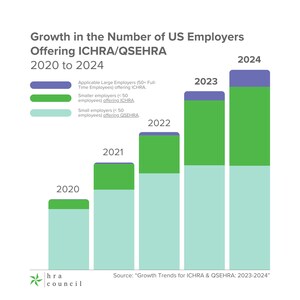Small and medium sized businesses lead innovation in new, bipartisan benefits model
WASHINGTON, Oct. 20, 2022 /PRNewswire/ -- The HRA Council has released its inaugural HRA Report, the first industry-wide snapshot of the uptake of newer models of health reimbursement arrangements like the Qualified Small Employer HRA (QSEHRA), established in 2017, and the Individual Coverage HRA (ICHRA), established in 2020. The HRA Report highlights the phenomenal growth of these defined contribution models and emphasizes their critical role in bolstering the health of the ACA marketplace, broadening access to quality care, and delivering more flexible benefits options for historically underserved and under-resourced small and medium sized businesses.
"Health Reimbursement Arrangements are a popular bipartisan policy solution to cover more Americans with affordable, quality health insurance," shares Robin Paoli, Executive Director of the HRA Council. "Employees are empowered to choose the coverage they want from respected regional and national insurers, and employers are empowered to offer predictable, cost-effective benefits with fewer administrative burdens."
HRAs are doubling on average among all states, with significant growth across all industries, types of employers and employee groups. 92% of adoption is happening among companies with 20 or fewer employees.
"We've seen the number of large employers switching to ICHRA grow exponentially," shares Jack Hooper, Chairman of the Board for the HRA Council and CEO and Founder of Take Command. "But small and medium sized businesses are leading the charge to deliver much-needed innovation in the benefits space, consumer empowerment and choice for employees, and cost control and flexibility for employers."
These new HRAs are bringing more accessibility to quality care and opening doors for smaller companies who haven't been able to offer benefits before. ICHRAs, in particular, are extending benefits to traditionally difficult to insure groups, like part-time and seasonal workers–all of which have seen big climbs in the wake of the pandemic.
"We've been building technology to support portable benefits in the 1099 economy for years, and it's incredible to see how ICHRAs are taking that model and using it to transform the W2 economy," said Noah Lang, CEO and Co-founder of Stride Health, the leader in portable benefits technology. "But as work becomes more fluid and flexible, we need to ensure that benefits do as well. In the years to come, it's important that this regulation be expanded so that all workers, regardless of classification, can receive tax-advantaged contributions from any type of work arrangement."
HRAs have continued to grow in popularity for their ability to address common challenges for businesses, like high renewals, participation rate concerns, or limited choices that don't serve the needs of a diverse workforce. ICHRAs have seen 3.5x growth since 2020, and QSEHRAs nearly doubled during the same period, representing strong and steady growth for the popular solution for firms with fewer than 50 employees.
"Traditionally, employers have only offered one group plan that may not have worked well for employees in different geographic locations, demographics, or family statuses," adds Victoria Glickman Hodgkins, CEO of PeopleKeep. "HRAs allow employers to offer a more personalized approach to health benefits."
Other report highlights include:
- Average participation rates for employees offered an ICHRA or QSEHRA is 60%, comparable to industry standards for employer-sponsored group plans.
- Average age of employees covered by an HRA is younger than the typical Healthcare.gov enrollee (largest age cohort is 55-64), meaning HRAs are bringing younger and healthier lives to the ACA marketplace.
- 57% of employees accepting an HRA to fund their marketplace health insurance are between 18 and 44, with the largest age cohort being 26 through 34 for each year since 2020.
The report is based on aggregate data from both administrators and enrollment platforms that comprise the Council, including BenefitBay, Flyte HCM, HealthSherpa, HRASimple, Nexben, OneBridge Benefits, PeopleKeep, Stride Health, Take Command, and zizzl health.
The HRA Council is a non-profit, non-partisan advocacy organization comprised of HRA administrators, carriers, enrollment firms, and practitioners working together to ease employers' ability to offer HRAs and employees' ability to use an HRA to enroll in coverage. With a shared mission, the Council educates employers and policymakers, works towards industry standards, shares collective industry research, and advocates for HRA-friendly regulations.
To request the full HRA Council report, contact [email protected].
Media Contacts
Name: Amy Skinner
Take Command
Email: [email protected]
Name: Abby Forman
Stride Health
Email: [email protected]
SOURCE HRA Council

WANT YOUR COMPANY'S NEWS FEATURED ON PRNEWSWIRE.COM?
Newsrooms &
Influencers
Digital Media
Outlets
Journalists
Opted In





Share this article